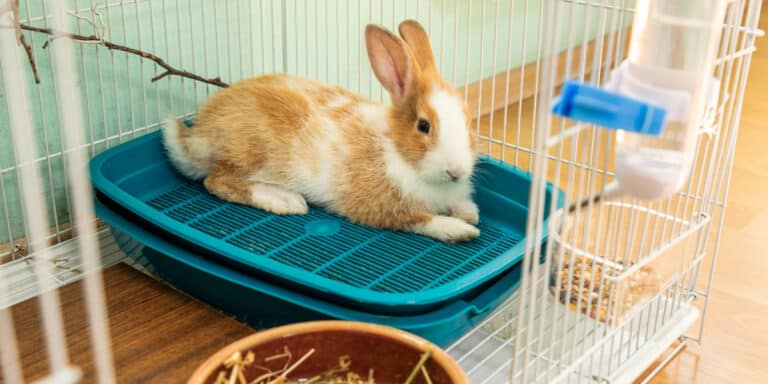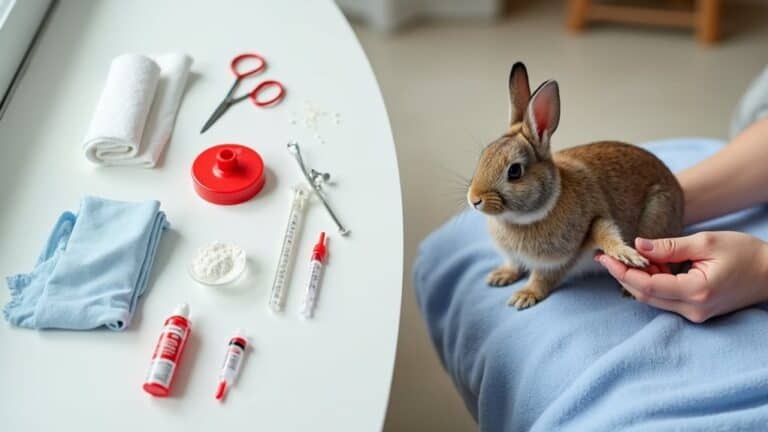In the world of pets, bunnies often steal the spotlight with their adorable antics and fluffy charm. But beyond their cuddly appearance lies a wealth of wisdom that extends far beyond the confines of a hutch.
Bunnies can make good pets for the right person. They are social, intelligent, and can be trained to use a litter box. However, they do require a lot of care and attention, including proper diet, space to run and play, and regular veterinary check-ups. It’s important to do your research and make sure you are willing to commit to caring for a bunny before getting one as a pet.
Rabbits are social creatures requiring interaction and companionship, either from their human owners or another rabbit. They thrive on a diet mainly composed of hay, supplemented with vegetables and a small number of pellets. Given their need for space to hop and explore, rabbits do best with ample room to roam safely. They also have a significant lifespan, often living more than ten years, which means adopting a rabbit is a long-term commitment.
Before bringing a bunny into your home, it’s crucial to consider the level of care they require, which includes understanding their social behaviors, diet, and the space they need to be healthy and happy. While rabbits can provide companionship and joy, they’re not a low-maintenance alternative to more common pets like cats and dogs. Properly cared for rabbits can indeed become a cherished part of the family.
Contents
- 1 Understanding Rabbits
- 2 Rabbit Care Essentials
- 3 The Social Nature of Rabbits
- 4 Socialization and Companionship
- 5 Training and Behavior
- 6 The Cost of Rabbit Ownership
- 7 Potential Challenges
- 8 Choosing the Right Rabbit
- 9 The Commitment to Rabbit Care
- 10 Rabbit Ownership Benefits
- 11 Frequently Asked Questions
- 11.1 What should be considered before adopting a rabbit as a pet?
- 11.2 Can rabbits adapt well to living indoors with families?
- 11.3 What do potential owners need to know about rabbit care and feeding?
- 11.4 How do rabbits typically interact with children and other pets?
- 11.5 What are common challenges people face when keeping rabbits as pets?
- 11.6 Do rabbits require a lot of maintenance and attention?
Key Takeaways
- Rabbits can be affectionate, sociable pets requiring a long-term commitment.
- They need a suitable diet, space to exercise, and regular interaction with humans or other rabbits.
- Understanding and meeting their care requirements is critical for a healthy, happy rabbit.
Understanding Rabbits
Before you decide to keep rabbits as pets, it’s important to understand their physical makeup and the various breeds that are popular choices for pet owners.
Physiology and Characteristics
Rabbits are known for their unique physiology. They have powerful hind legs, which are used for hopping and jumping. Their ears can be large or small, depending on the breed, serving not only for hearing but also to regulate body temperature. Rabbits also have a specialized digestive system that requires a diet mainly consisting of hay, which provides the fiber essential for their gut health.
Common Breeds:
- Rex: Known for its velvety fur and friendly disposition.
- Mini Rex: A smaller version of the Rex with the same plush coat.
- Lop: This group is characterized by their drooping ears and includes breeds like the Mini Lop, which is beloved for its compact size and sweet nature.
- Lionhead: Distinctive for its fluffy mane and smaller size.
- Dutch: Recognizable by their unique color patterns with a white blaze on the face.
- English Spot: Has a distinctive spotted pattern and an energetic personality.
- Hotot: Noted for the striking white coat with a band of black around their eyes, resembling eyeliner.
These breeds possess a variety of temperaments, but typically, rabbits are quiet and sociable animals that can form strong bonds with you as their owner.
Rabbit Care Essentials
Providing proper care for your rabbit entails a balanced diet, ample space, regular health checkups, and a safe living environment. Thorough knowledge of these needs will ensure your rabbit thrives under your care.
Dietary Needs
Your rabbit’s diet should primarily consist of high-quality hay, which aids in digestive health and helps prevent dental issues. Ensure they have access to fresh water at all times. Supplement their diet with a variety of vegetables, such as carrot tops and leafy greens. Limit the amount of pellets and treats, as they are high in calories.
- Hay: Unlimited, daily (70-80% of the diet)
- Fresh greens: 1-2 cups per 6 lbs of body weight per day
- Pellets: 1/4 cup per 6 lbs of body weight per day
- Water: Fresh, changed daily
Housing and Space Requirements
Adequate space is crucial for your rabbit’s well-being. Indoor housing should be large enough for them to stretch out and hop around freely. The flooring should be supportive and nonslip. Include a private area for them to retreat to for rest. Additionally, your rabbit requires daily exercise, so a safe and sizable playpen or secure room is necessary.
- Cage Size: Minimum 12 square feet for the enclosure
- Exercise Area: Extra 24-32 square feet for playtime
Rabbit-Proofing Your Home
Rabbits are naturally curious and love to chew, which means regular cleaning and maintenance are vital. Secure all electrical cords and remove potentially harmful substances and plants from your rabbit’s reach. Use gates or pens to restrict access to unsafe areas. Rabbit-proofing your home protects both your pet and your belongings.
Health and Veterinary Care
Establishing a relationship with a veterinarian experienced in rabbit care is crucial. Schedule regular check-ups and keep an eye out for signs of illness. Rabbits often hide their ailments, so attentive monitoring for changes in behavior or appetite is essential. Keep their living area clean to minimize the risk of disease, and groom your rabbit to prevent hairballs.
- Veterinarian Check-ups: At least once a year
- Common Supplies: Nail clippers, grooming brush, litter box
By following these guidelines, you can create a nurturing environment where your rabbit can lead a happy and healthy life.
The Social Nature of Rabbits

Understanding the social dynamics of rabbits is crucial if you’re considering one as a pet. These social animals thrive in environments where they can interact and communicate, forming strong bonds with their owners as well as with other rabbits.
Socialization and Companionship
Pet rabbits seek out companionship and often display affectionate behavior towards their human caregivers and fellow rabbits. It’s essential to frequently interact with your pet rabbit to help them become well-socialized, thus reducing the risk of behavioral problems associated with loneliness or boredom. Children can also participate in socializing with pet rabbits, which should always be supervised to ensure gentle handling and mutual respect.
Behavior and Communication
Rabbits have a distinct way of communicating, using body language and subtle vocalizations. You’ll observe that your pet rabbits may express contentment with soft purring sounds or show excitement by performing binkies—an abrupt jump and twist in the air. Understanding and responding to these behaviors builds a stronger connection between you and your rabbits. It’s important to recognize that healthy social interactions can enhance a rabbit’s well-being, reflecting their intrinsic need to be part of a social group.
Training and Behavior
Bunnies are intelligent creatures capable of being litter trained and learning various tricks, which provide necessary mental stimulation. Training enhances your pet’s life quality and strengthens your bond with them.
Litter Training
Your bunny has the intelligence to be litter trained. You will need:
- A litter box big enough for your rabbit to fit comfortably.
- Non-clumping, paper-based or organic litter which is safe for rabbits.
Place the litter box in your bunny’s enclosure, and note their chosen bathroom corner to guide placement. Initially, some hay inside the litter box can encourage use, as rabbits tend to eat and defecate at the same time. Consistency and patience are vital in litter training.
Tricks and Mental Stimulation
Training your rabbit isn’t limited to litter training; you can teach them tricks too for further stimulation:
Come When Called
- Use a specific word or sound and reward them with a treat when they approach you.
Jump Through Hoops
- Use a hoop and entice your bunny to hop through with a treat, gradually raising the hoop’s height.
Toys and games are important for your rabbit’s mental well-being. Provide a variety of items, such as:
- Puzzle feeders
- Cardboard boxes
- Digging platforms
These ensure adequate stimulation and prevent boredom, making your bunny a more engaged and content pet.
The Cost of Rabbit Ownership

Understanding the financial responsibility of owning a rabbit is essential before you decide to bring one home. You’ll need to consider both the initial adoption costs and the supplies you’ll need to start, as well as the ongoing expenses to provide proper care for your furry companion.
Initial Adoption and Supplies
The journey with your new pet rabbit begins with the adoption fee, which can range from $35 to $200+. You’ll find that adopting from shelters is often less expensive and also gives you the opportunity to give a home to a rabbit in need. Then, there are supplies to consider. To set up your rabbit’s living space, you’ll need a hutch or cage, bedding, a litter box, water bottles, and food dishes. The cost for all these initial essentials can go up to $300. Additionally, your starter kit should include hay, pellets, vegetables, and possibly toys for enrichment, which can cost around $50. Be prepared to spend a total of anywhere from $385 to $550 initially when you adopt a pet rabbit.
Long-Term Financial Commitment
The cost of ownership doesn’t stop after adoption. Taking care of a rabbit involves a long-term financial commitment. Expect recurring costs for hay, pellets, fresh vegetables, and veterinary care. Monthly expenses can range from $50 to $150, depending on factors such as diet and health needs. It’s also wise to budget for unexpected medical costs or emergencies. Keep in mind that rabbits can live for approximately 9 to 12 years, and therefore, the commitment isn’t just emotional but also financial across the life of your pet. For detailed insights on ongoing monthly costs, such as the specifics of food and health care expenses, you can refer to the guide on the ongoing costs associated with rabbit care.
Potential Challenges

When you bring a bunny into your home, you’re inviting a creature with instincts that may clash with your human environment. Two common issues you’ll face include their need to chew and the special care required when handling them.
Chewing and Destructive Behavior
Your bunny’s natural inclination to chew can lead to destructive behavior if not managed correctly. Rabbits need to gnaw to keep their constantly growing teeth trimmed. However, this can result in chewed furniture, carpets, or wires, which pose potential harm to both your belongings and your pet. To mitigate this, provide plenty of safe chewing options like untreated wood blocks or cardboard boxes.
Handling and Sensitivity to Harm
While rabbits can be affectionate, they’re also prey animals and may be prone to injuries if handled improperly. Their delicate spines can be injured if they scratch or struggle when being picked up. It’s crucial for you and any others in the household to learn the proper technique to ensure your bunny doesn’t experience any unnecessary harm.
Remember, every bunny has its own personality. With consistent, gentle interaction, your pet can learn to trust you, reducing the instinctive behaviors that can lead to challenges.
Choosing the Right Rabbit
When considering adding a rabbit to your home, it’s crucial to understand whether a house rabbit or pet bunny suits your lifestyle, as well as to select the appropriate breed and adoption source.
Pet Bunny or House Rabbit?
A house rabbit can roam freely within your home, becoming a part of your daily life much like a cat or dog. This choice demands rabbit-proofing your space to protect both your bunny and your belongings. Pet bunnies, on the other hand, are often kept in enclosures but still require time out for exercise and social interaction. Whichever option you choose, both will need your attention and commitment.
Selecting a Breed and Where to Adopt
Selecting a breed involves considering size, temperament, and coat type that match your lifestyle. For example, the Netherland Dwarf is a small and typically good-natured companion, while larger breeds like the Flemish Giant have a gentle, laid-back nature. When it’s time to adopt, consider rescue centers or animal shelters where many rabbits await a second chance at a loving home. Adoption can also offer the opportunity to speak with knowledgeable staff about the needs and characteristics of your potential new family member.
The Commitment to Rabbit Care
When considering a rabbit as a pet, you need to be aware of the daily care requirements and understand their potential long lifespan, which can mean a significant time commitment.
Daily Responsibilities
Your daily tasks will include providing fresh food and water, ensuring that your bunny gets enough daily exercise, and maintaining cleanliness in their living area. Rabbits are social creatures that thrive on interaction and require mental stimulation, which means you should spend time playing with your rabbit to keep them happy.
- Feeding: Fresh hay should be the main component of their diet, supplemented with a variety of vegetables, and occasional fruit.
- Hydration: Clean water must be available at all times.
- Exercise: At least an hour of supervised, safe indoor or outdoor playtime.
- Cleaning: Litter boxes and living spaces need regular cleaning to prevent odor and health issues.
Understanding Rabbit Lifespan
Rabbits have a long lifespan, often living more than 10 years. This longevity requires a long-term commitment from you, ensuring that your bunny is cared for throughout its life. Regular check-ups with a veterinarian familiar with rabbits are essential to maintain their health over the years.
Rabbit Ownership Benefits
When considering a pet, rabbits offer unique advantages. Your experience with a rabbit can be emotionally fulfilling and provide educational value, especially if there are children in your home.
Emotional Rewards
Rabbits, known for their cute and affectionate nature, can contribute significantly to your emotional well-being. Forming close bonds with their owners, many find that their pet rabbits become a cherished part of the family. Studies indicate that the mere act of watching a rabbit can help lower a person’s stress levels, leading to a more happy and healthy life.
A pet bunny will love you for their entire lifespan, which typically ranges from 8 to 12 years. These loving relationships often develop through gentle handling and consistent interaction, rewarding you with a furry friend who enjoys your companionship.
Educational Value for Children
Rabbits can serve as excellent starter pets for children, teaching them responsibility and the importance of routine care. Kids learn valuable life lessons such as empathy and compassion through daily tasks such as feeding, grooming, and providing clean water.
Children also gain a hands-on understanding of pet behavior and health, witnessing firsthand what keeps their rabbit happy and healthy. Caring for a rabbit can foster a sense of pride and accomplishment as children observe the positive effects of their care on their pet’s well-being.
Frequently Asked Questions
Before bringing a bunny into your home, understanding the nuances of rabbit care is essential. These FAQs touch on key considerations and insights for prospective rabbit owners.
What should be considered before adopting a rabbit as a pet?
Rabbits require a dedicated environment and attention to thrive and can live for more than ten years. It’s important to commit to providing long-term care, a proper diet, social interaction, and space for exercise.
Can rabbits adapt well to living indoors with families?
Yes, rabbits can become a cherished part of the family when kept indoors. They require a safe space to roam and can be litter box trained, similar to cats, for easier cohabitation.
What do potential owners need to know about rabbit care and feeding?
Proper rabbit care involves providing a balanced diet of hay, fresh vegetables, and a small number of pellets. Regular veterinary check-ups are crucial, and understanding rabbit behavior is key to meeting their needs.
How do rabbits typically interact with children and other pets?
While rabbits can interact well with older, responsible children, supervision is always recommended. Introductions to other pets should be gradual and monitored to ensure safety, as rabbits are often prey animals in nature.
What are common challenges people face when keeping rabbits as pets?
Rabbits are known to chew and dig, so proofing your home is necessary to prevent damage. They can also be quite prone to shedding, requiring regular grooming and a cleanup of their fur.
Do rabbits require a lot of maintenance and attention?
Rabbits need daily interaction and maintenance to stay healthy and happy. They need their living space cleaned regularly, time out of their enclosure for exercise, and mental stimulation to prevent boredom.



